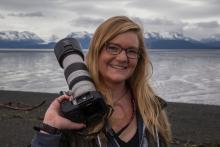I am completing my Departmental Honors Project in Dr. Pabst's Vertebrate Anatomy and Biomechanics Lab (VABLAB) researching the presence and potential migratory movements of North Atlantic right whales in the waters of the mid-Atlantic. I am mapping all right whale sightings in ArcGIS, describing the composition and temporal occurrence of these sightings, and conducting spatial analyses.
During the summer of 2015, I participated in an internship at Mote Marine Laboratory in Sarasota, FL. I was working with their Strandings Investigations Program to respond to live and dead strandings of sea turtles and marine mammals in Sarasota County.
While participating in a transient study program, Semester by the Bay, in Homer, AK during the fall semester of my junior year, I was selected to participate in a whale photo-identification internship throughout the semester. I created a photographic identification catalog website for the humpback whales of Kachemak Bay, AK and updated matriline phylogenies of pods of southern Alaska resident killer whales. I completed a second internship with Alaska Maritime U.S. Fish and Wildlife Service’s sea otter stranding response team.
As a part my NOAA Hollings Scholarship award, I interned at the NOAA Northwest Fisheries Science Center in Seattle, WA this past summer. I conducted my own research project on the acoustic behavior of Southern Resident killer whales and analyzed data from passive acoustic monitors to improve our understanding of SRKW sound production and distribution in their coastal habitat.
I started to become invloved by volunteering with UNCW's Marine Mammal Stranding Program my freshman year. I attended meetings and my first necropsy workshop that year and volunteered as much as I could with the lab. After gaining more experince in necropsies and sample collection, I was offered a chance to become the program's Undergradaute Stranding Coordinator. I also conducted a DIS with Dr. Pabst my sopomore year, which helped form the topic of my honors project. I hoped to gain more experience in data collection and experimental design, which will be useful for graduate school.
This is been such a great experience. Starting out in my freshman year, I did not know how much information you can gain about a species in so many different ways. I've learned about many of those different data collection techniques as well as writing and presentation skills. There have been times that have been challenging, as when data collection does not go as planned, but those hiccups have taught me how to problem-solve and keep working towards my goals. My applied learning experiences have shown me many different research avenues I can take in my career as well as the tools to help me conduct my research.
These research experiences have helped me gain necessary skills and the ability to think critically, which I will be able to apply to my graduate studies. Potential employers and graduate school advisors recognize how much work goes into completing a research project, and having this experience can set you apart from other applicants. I have also had the chance to enhance my public speaking skills by presenting my research at conferences and networkk with researchers in the field.





